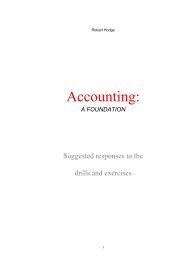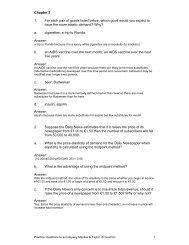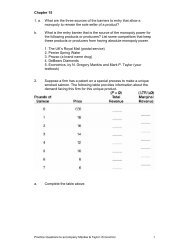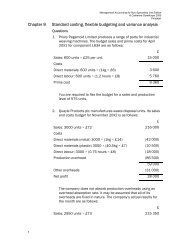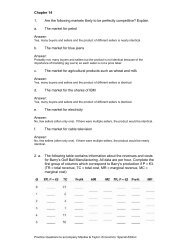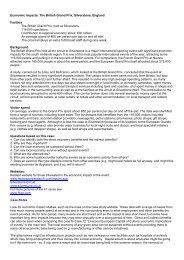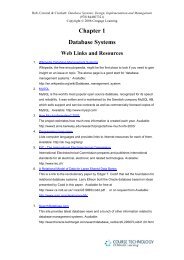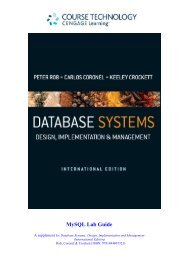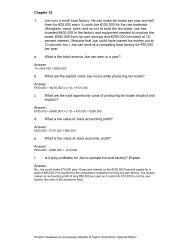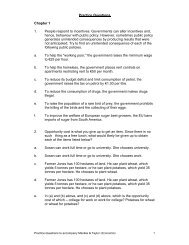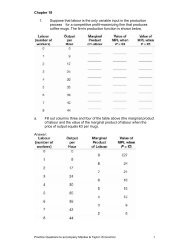31017_05_Ch05_p109-136.qxd 9/7/07 12:15 PM Page 132132 <strong>CHAPTER</strong> 5 RECRUITING AND SELECTING STAFFSummaryThis chapter has addressed key issues affecting recruitment <strong>and</strong> selection <strong>for</strong><strong>international</strong> <strong>assignments</strong>. We have covered:● Four myths related to the concept of a global manager: that there is auniversal approach to management; that people can acquire multiculturaladaptability <strong>and</strong> behaviors; that there are common characteristics successful<strong>international</strong> managers share; <strong>and</strong> that there are no impediments tomobility.● The debate surrounding the definition <strong>and</strong> magnitude of expatriatefailure.● Cultural adjustment <strong>and</strong> other moderating factors affecting expatriateintent to stay <strong>and</strong> per<strong>for</strong>mance. These included duration of the assignment,willingness to move <strong>and</strong> work-related factors.● Individual <strong>and</strong> situational factors to be considered in the selectiondecision. Evaluation of the common criteria used revealed the difficultyof <strong>selecting</strong> the right c<strong>and</strong>idate <strong>for</strong> an <strong>international</strong> assignment <strong>and</strong> theimportance of including family considerations in the selection process.● Dual career couples as a barrier to <strong>staff</strong> mobility, <strong>and</strong> the techniquesmultinationals are utilizing to overcome this constraint.● Female expatriates <strong>and</strong> whether they face different issues to their malecounterparts.It is also clear that, while our appreciation of the issues surrounding expatriaterecruitment <strong>and</strong> selection has deepened in the past 30 years, much remainsto be explored. The field is dominated by US research into predominantlyUS samples of expatriates, though there has been an upsurge ininterest from European academics <strong>and</strong> practitioners. Will the factors affectingthe selection decision be similar <strong>for</strong> multinationals emerging fromcountries such as China <strong>and</strong> India? If more multinationals are to encouragesubsidiary <strong>staff</strong> to consider <strong>international</strong> <strong>assignments</strong> as part of an intraorganizationalnetwork approach to management, we will need furtherunderst<strong>and</strong>ing of how valid the issues discussed in this chapter are <strong>for</strong> allcategories of <strong>staff</strong> from different country locations. It is apparent, though,that <strong>staff</strong> selection remains critical. Finding the right people to fill positions,particularly key managers – whether PCN, TCN or HCN – can determine <strong>international</strong>expansion. However, effective recruitment <strong>and</strong> selection is onlythe first step.Discussion Questions1 What is the difference between a global manager <strong>and</strong> a global mindset?2 Should multinationals be concerned about expatriate failure? If so, why?3 What are the most important factors involved in the selection decision?4 Are female expatriates different?5 Discuss the proposition that most expatriate selection decisions are madein<strong>for</strong>mally, as suggested by the ‘coffee-machine’ solution.
31017_05_Ch05_p109-136.qxd 9/7/07 12:15 PM Page 133<strong>CHAPTER</strong> 5 RECRUITING AND SELECTING STAFF 133Further ReadingBoudreau, J., Ramstad, P. <strong>and</strong> Dowling, P.J. (2003). ‘Global Talentship: Toward a Decision ScienceConnecting Talent to Global Strategic Success’, in W.H. Mobley <strong>and</strong> P.W. Dorfman (eds), Advances inGlobal Leadership, Vol. 3, Ox<strong>for</strong>d: Elsevier Science, pp. 63–99.International Studies of Management & Organization (2004). Special issue on Expatriation in theNew Millenium, guest ed. Moshe Banai, 34(3).Scullion, H. <strong>and</strong> Collings, D. (eds) (2006). Global Staffing, London: Routledge.Tarique, I., Schuler, R. <strong>and</strong> Gong, Y. (2006). ‘A Model of Multinational Enterprise Subsidiary StaffingComposition’, International Journal of Human Resource Management, 17(2): 207–24.Notes <strong>and</strong> References1 H. Scullion <strong>and</strong> D. Collings, ‘International Recruitment <strong>and</strong> Selection’, in H. Scullion <strong>and</strong>D. Collings (eds), Global Staffing (London, Routledge, 2006), pp. 59–86.2 For a recent review of the culture literature, see K. Leung, R. Bhagat, N. Buchan, M. Erez <strong>and</strong>C. Gibson, ‘Culture <strong>and</strong> International Business: Recent Advances <strong>and</strong> Their Implications <strong>for</strong>Future Research’, Journal of International Business Studies, Vol. 36, No. 4 (2005), pp. 357–78.3 F.T. Murray <strong>and</strong> A.H. Murray, ‘Global Managers <strong>for</strong> Global Businesses’, Sloan ManagementReview, Vol. 27, No. 2 (1986), pp. 75–80.4 N. Forster, ‘The Myth of the “International Manager”’, International Journal of Human ResourceManagement, Vol. 11, No. 1 (2000), pp. 126–42. See also C.A. Bartlett <strong>and</strong> S. Ghoshal, ‘The Mythof the Generic Manager: New Personal Competencies <strong>for</strong> New Management Roles’, Cali<strong>for</strong>niaManagement, Review, Vol. 40, No. 1 (1997), pp. 92–116.5 Y. Baruch, ‘No Such Thing as a Global Manager’, Business Horizons, January–February (2002),pp. 36–42.6 N. Forster, ‘The Persistent Myth of High Expatriate Failure Rates’, International Journal ofHuman Resource Management, Vol. 8, No. 4 (1997), p. 430.7 Price Waterhouse (eds), International Assignments: European Policy <strong>and</strong> Practice (London:Price Waterhouse, 1997).8 R.L. Tung, ‘Selection <strong>and</strong> Training of Personnel <strong>for</strong> Overseas Assignments’, Columbia Journalof World Business, Vol. 16, No. 1 (1981), pp. 68–78; R.L. Tung, ‘Selection <strong>and</strong> TrainingProcedures of US, European <strong>and</strong> Japanese Multinationals’, Cali<strong>for</strong>nia Management Review,Vol. 25, No. 1 (1982), pp. 57–71; <strong>and</strong> R.L. Tung, ‘Human Resource Planning in JapaneseMultinationals: A Model <strong>for</strong> US Firms?’, Journal of International Business Studies (Fall 1984),pp. 139–49.9 C. Brewster, The Management of Expatriates, Human Resource Research Centre MonographSeries, No. 2 (Bed<strong>for</strong>d: Cranfield School of Management, 1988). In a pilot study, Hamillinvestigated the IHRM practices <strong>and</strong> policies of seven British multinationals. He found that thefailure rate among British expatriates was significantly lower (less than 5 per cent) than thatreported <strong>for</strong> US multinationals ( J. Hamill, ‘Expatriate Policies in British Multinationals’, Journalof General Management, Vol. 14, No. 4 (1989), pp. 19–33; E. Marx, International HumanResource Practices in Britain <strong>and</strong> Germany (London: Anglo-German Foundation, 1996).10 A.-W. Harzing, ‘The Persistent Myth of High Expatriate Failure Rates’, International Journal ofHuman Resource Management, Vol. 6, No. 2 (1995), p. 458.11 C. Christensen <strong>and</strong> A.-W. Harzing, ‘Expatriate Failure: Time to Ab<strong>and</strong>on the Concept?’, CareerDevelopment International, Vol. 9, No. 7 (2004), pp. 616–26.12 Organizational Resource Councelors Inc, ‘Dual Careers <strong>and</strong> International Assignments Survey’(2002). The organization changed its name to ORC Worldwide in 2003.13 I. Björkman <strong>and</strong> M. Gertsen, ‘Corporate Expatriation: An Empirical Study of Sc<strong>and</strong>inavian Firms’,in ‘Proceedings of the Third Symposium on Cross-Cultural Consumer <strong>and</strong> Business Studies’,Honolulu (December 1990). Danish firms did not respond to Tung’s survey, but the Swedish <strong>and</strong>Norwegian firms did.14 P.J. Dowling <strong>and</strong> D. Welch, ‘International Human Resource Management: An AustralianPerspective’, Asia-Pacific Journal of Management, Vol. 6, No. 1 (1988), pp. 39–65. Althoughprecise records were not kept, the four companies estimated failure rates of less than 5 per cent.15 For example, Enderwick <strong>and</strong> Hodgson explain the absence of ‘expatriate failure’ in their study ofNew Zeal<strong>and</strong> firms may be due to their early stages in <strong>international</strong>ization. See P. Enderwick <strong>and</strong>D. Hodgson, ‘Expatriate Management Practices of New Zeal<strong>and</strong> Business’, International Journalof Human Resource Management, Vol. 4, No. 2 (1993), pp. 407–23.



